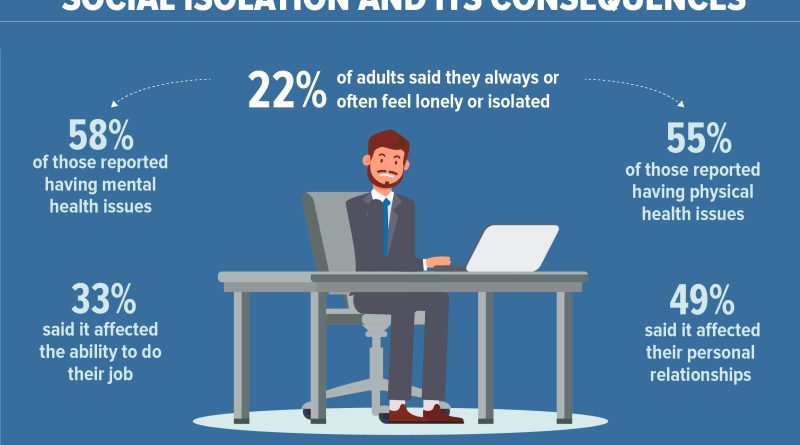How Does Loneliness Impact Your Physical and Mental Health
Loneliness, a state of profound isolation and lack of connection, is a growing public health concern. It’s no longer simply a feeling of sadness; research now shows a direct link between loneliness and a multitude of negative health consequences.
Recent studies paint a concerning picture. A 2023 advisory by the U.S. Surgeon General Vivek Murthy highlights that loneliness can increase the risk of premature death by as much as 26% [1]. This rivals the dangers of smoking and chronic illness.
The Two Sides of Loneliness: Physical and Mental Health Impacts
Loneliness’s impact is two-pronged, affecting both our physical and mental well-being.
- Physical Health: Chronically feeling lonely can weaken the immune system, making us more susceptible to infections and illnesses [2]. Research published in the journal “Heart” in 2016 found a link between loneliness and an increased risk for heart disease and stroke [3]. A 2020 study published by SelectHealth suggests that loneliness can also lead to poor sleep habits, weight gain, and a higher vulnerability to chronic health conditions [2].
Sarah, a 52-year-old accountant from Chicago, shares her experience, “After my divorce, I found myself incredibly alone. I wasn’t eating healthy, wasn’t sleeping well, and constantly felt run down. I eventually went to the doctor, and they mentioned loneliness as a potential factor in my declining health.”
- Mental Health: The mental health consequences of loneliness are equally concerning. Loneliness is a well-established risk factor for depression and anxiety disorders [4]. A recent report by the Centers for Disease Control and Prevention (CDC) highlights a link between loneliness and addiction, including alcohol and drug misuse [5]. Feelings of isolation can also contribute to suicidal ideation and self-harm [5].
David, a 23-year-old college student from Austin, Texas, says, “During the pandemic, online classes and social distancing took a toll on me. I felt disconnected from everyone and fell into a deep depression. It took a lot of effort to reach out and rebuild my social circle, but it made a huge difference in my mental well-being.”
Read More: ASD & ADHD in Childcare – How to Specialize in Pediatric Psychology?
Why Does Loneliness Have Such a Powerful Impact?
The far-reaching effects of loneliness can be explained by our inherent need for social connection. Humans are social creatures, and strong social bonds provide a sense of belonging, security, and purpose. Loneliness disrupts this, triggering a stress response in the body. This chronic stress can lead to the health problems mentioned previously.
Combating Loneliness: Steps We Can Take
The good news is that loneliness is treatable. Here are some steps we can take to combat it:
- Reach out and build social connections: Join a club, volunteer, or reconnect with old friends.
- Nurture existing relationships: Take time for quality interactions with loved ones.
- Seek professional help: If feelings of loneliness persist, consider talking to a therapist.
Social support systems are crucial for our overall health. By prioritizing social connection and addressing loneliness, we can improve our physical and mental well-being and create a healthier society.
Looking Forward: Addressing Loneliness as a Public Health Issue
The Surgeon General’s advisory calls for a multi-pronged approach to address loneliness. This includes promoting social connection programs, reducing social isolation among vulnerable populations like older adults, and integrating loneliness screening into healthcare practices [1].
By acknowledging loneliness as a serious public health concern and taking proactive steps to address it, we can create a more connected and healthier world for everyone.
Sources:
- [1] U.S. Department of Health and Human Services. “Surgeon General’s Advisory on Loneliness.” December 2023. https://www.hhs.gov/about/news/2023/05/03/new-surgeon-general-advisory-raises-alarm-about-devastating-impact-epidemic-loneliness-isolation-united-states.html
- [2] Select Health. “The Feeling of Loneliness and Its Impact on Physical Health.” March 10, 2020. https://selecthealth.org/blog/2020/12/loneliness-and-its-impact-on-physical-health
- [3] Pantell, M., Rehkopf, D., Jutte, D., Syme, S. L., Balmes, J., & Adler, N. (2016). Loneliness and social isolation as risk factors for coronary heart disease and stroke: systematic review and meta-analysis of longitudinal observational studies. Heart, 102(13), 1009-1016.




